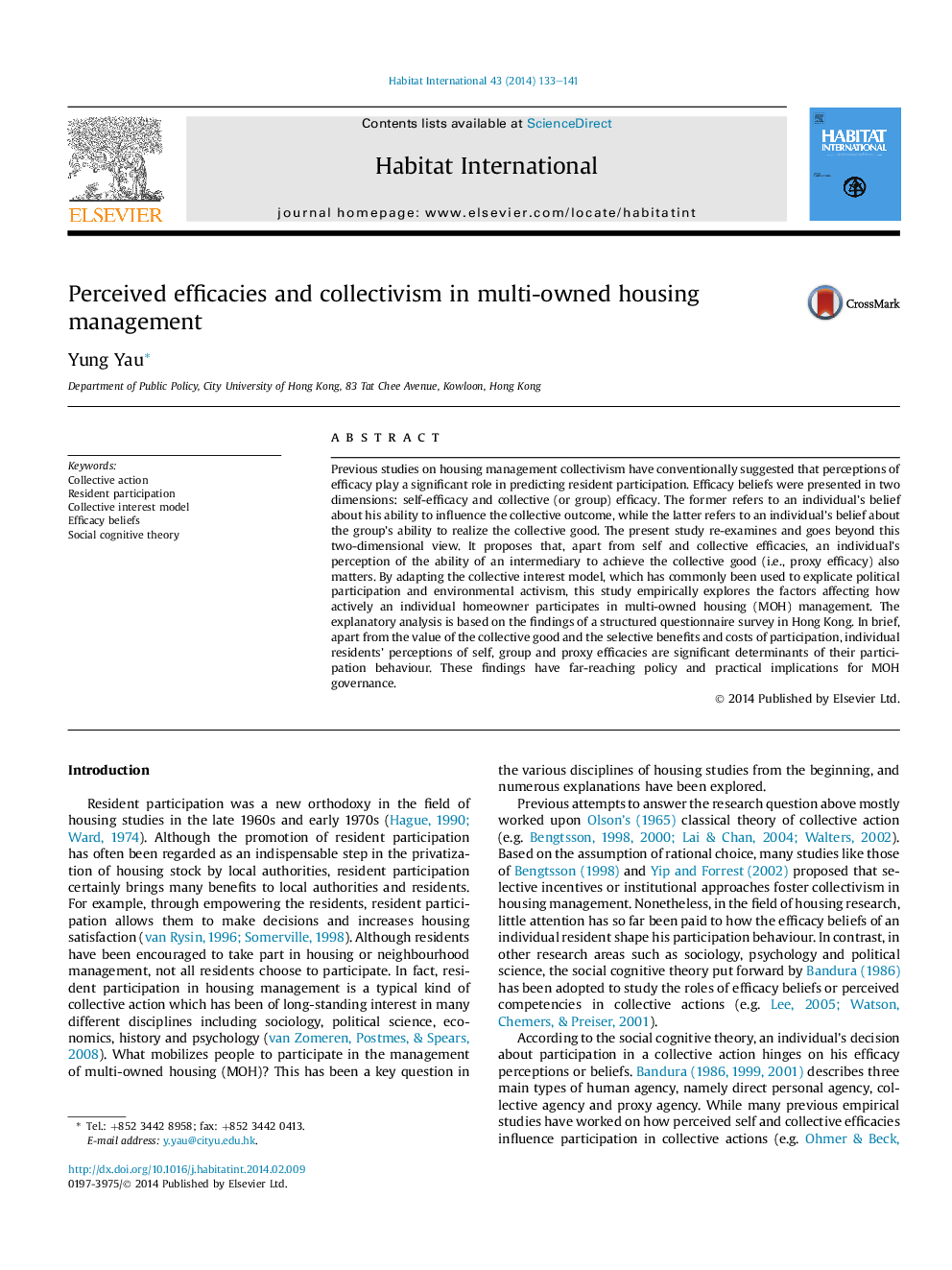| کد مقاله | کد نشریه | سال انتشار | مقاله انگلیسی | نسخه تمام متن |
|---|---|---|---|---|
| 7456378 | 1484499 | 2014 | 9 صفحه PDF | دانلود رایگان |
عنوان انگلیسی مقاله ISI
Perceived efficacies and collectivism in multi-owned housing management
ترجمه فارسی عنوان
کارآیی درک شده و جمع گرایی در مدیریت مالکیت چند منظوره
دانلود مقاله + سفارش ترجمه
دانلود مقاله ISI انگلیسی
رایگان برای ایرانیان
کلمات کلیدی
اقدام جمعی، مشارکت ساکنین، مدل منافع مشترک، اعتقادات اثربخشی، نظریه شناختی اجتماعی،
ترجمه چکیده
مطالعات قبلی در مورد مالکیت انگیزش در مدیریت مسکن به طور معمول نشان می دهد که ادراکات کارایی نقش مهمی در پیش بینی مشارکت ساکنان دارد. اعتقادات اثربخشی در دو بعد ارائه شد: خودکارآمدی و کارآمدی جمعی (یا گروهی). سابق به اعتقاد فردی در مورد توانایی وی در تأثیر بر نتیجه جمعی اشاره می کند، در حالی که این دوم به اعتقاد فرد در مورد توانایی گروه برای تحقق بخشیدن به خواسته جمعی اشاره می کند. این مطالعه مجددا بررسی و فراتر از این دید دو بعدی می رود. پیشنهاد می کند که، به غیر از اثربخشی های خود و جمعی، درک فرد از توانایی یک واسطه برای دستیابی به خوشه جمعی (یعنی کارایی پروکسی) نیز اهمیت دارد. در این مطالعه تجربی از طریق مدل سازی منافع جمعی، که معمولا برای توضیح مشارکت سیاسی و فعالیت های محیط زیست مورد استفاده قرار می گیرد، عوامل موثر بر نحوه فعالانه صاحب خانه مالک در مدیریت مسکن متعلق به ملک می شود. تجزیه و تحلیل توضیحی مبتنی بر یافته های تحقیق پرسشنامه ساخت یافته در هنگ کنگ است. به طور خلاصه، صرف نظر از ارزش خیر جمعی و منافع انتخابی و هزینه های مشارکت، ادراک افراد ساکن در مورد خود، گروه و اثربخشی پروکسی، تعیین کننده های مهم رفتار مشارکت آنها است. این یافته ها سیاست و اهداف عملی گسترده ای را برای مدیریت حکومت وزارت امور خارجه دارد.
موضوعات مرتبط
علوم انسانی و اجتماعی
علوم اجتماعی
توسعه
چکیده انگلیسی
Previous studies on housing management collectivism have conventionally suggested that perceptions of efficacy play a significant role in predicting resident participation. Efficacy beliefs were presented in two dimensions: self-efficacy and collective (or group) efficacy. The former refers to an individual's belief about his ability to influence the collective outcome, while the latter refers to an individual's belief about the group's ability to realize the collective good. The present study re-examines and goes beyond this two-dimensional view. It proposes that, apart from self and collective efficacies, an individual's perception of the ability of an intermediary to achieve the collective good (i.e., proxy efficacy) also matters. By adapting the collective interest model, which has commonly been used to explicate political participation and environmental activism, this study empirically explores the factors affecting how actively an individual homeowner participates in multi-owned housing (MOH) management. The explanatory analysis is based on the findings of a structured questionnaire survey in Hong Kong. In brief, apart from the value of the collective good and the selective benefits and costs of participation, individual residents' perceptions of self, group and proxy efficacies are significant determinants of their participation behaviour. These findings have far-reaching policy and practical implications for MOH governance.
ناشر
Database: Elsevier - ScienceDirect (ساینس دایرکت)
Journal: Habitat International - Volume 43, July 2014, Pages 133-141
Journal: Habitat International - Volume 43, July 2014, Pages 133-141
نویسندگان
Yung Yau,
